Every kingdom divided against itself is brought to desolation, and every city or house divided against itself shall not stand.” This quote from the book of Matthew in the Bible served as inspiration to Abraham Lincoln, who famously paraphrased it in a speech on June 16, 1858. Three years later, the start of the American Civil War reinforced the truth of these words, but it’s far from an isolated example.
From the fall of Rome to the breakup of the Soviet Union, history has proved time and again that deep-seated division is a cancer that — if left unchecked — can topple empires. That’s not to say that differences of opinion are a death knell for any society. In many cases, they’re the exact opposite, serving as a sign of healthy discourse and freedom of expression. But if the division turns to blind hatred, and hatred escalates to violence, a tipping point may be reached.
In modern history, this phenomenon has been referred to as Balkanization, a reference to the division of the Balkan peninsula after the collapse of the Ottoman Empire in the early 1900s. The Balkan region — containing modern-day Croatia, Bosnia and Herzegovina, Serbia, Slovenia, Montenegro, Kosovo, and North Macedonia, among other nations — has faced numerous periods of instability, war, and genocide in the last few centuries, earning it the nickname “the powder keg of Europe.” Some of these nations were united into Yugoslavia after World War I, but then split once more in the early 1990s, leading to a decade of vicious wars.
Even now, tensions are mounting once again between Serb and Bosnian leaders due to disputes over recognition of previous war crimes. In an interview with the History Channel, Princeton University associate professor of Near Eastern Studies Michael A. Reynolds cited the Balkan region’s “tremendous diversity in terms of ethnicity, language, economics, and geography” as a rift that made unification difficult.
A declassified CIA memo from 1983 explained that “problems in the Balkans have deep roots,” including economic decline, political tyranny and turmoil, fierce national/ethnic/religious rivalries, and the deliberate intervention of large outside powers (namely the USSR).
For many Americans, those problems sound uncomfortably familiar. As we approach another highly divisive presidential election in November, the news media and politicians are fanning the flames to turn neighbors and families against one another. Although we sincerely hope for a better outcome, we can’t help but contemplate what might happen if the United States became fragmented much like the failed state of Yugoslavia.
Editor’s Note: Our goal for this article is not to make a political statement, it’s to make you think about how to prepare for large-scale unrest and instability. Try not to read this through the lens of partisan politics. Instead, focus on steps you can take to be ready for possible Balkanization of America — or better yet, to prevent it altogether.
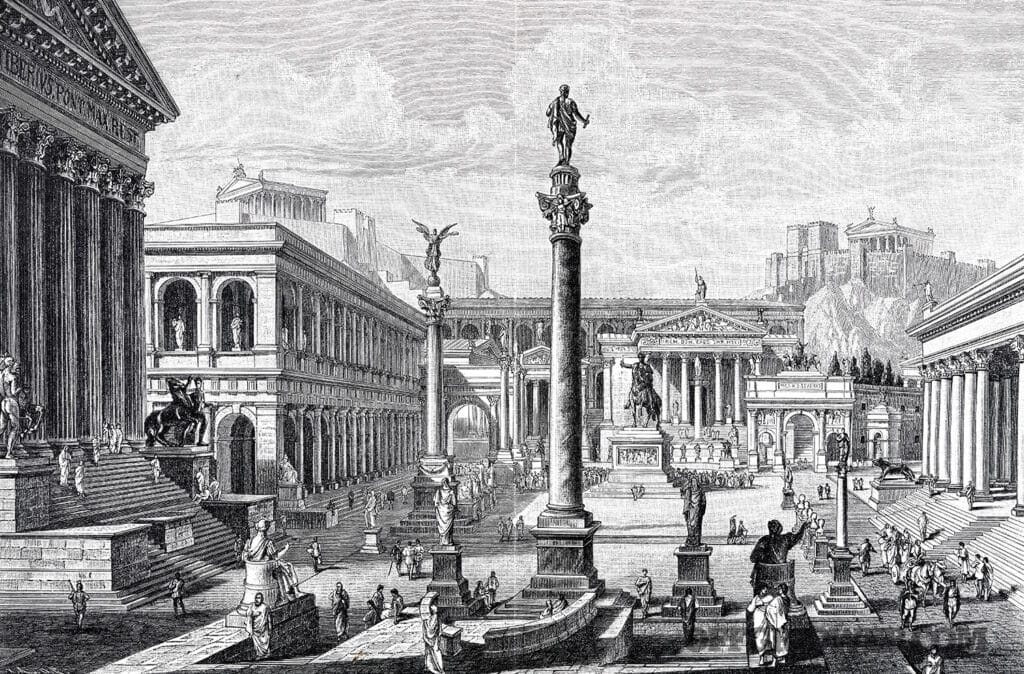
Above: History provides countless examples of nations and empires rising to power and breaking apart. Economic decline, political turmoil, and bitter rivalries between internal factions are common hallmarks of this process.
The Scenario: Fragmented Nation
Situation type: Balkanization of America
Your Crew: Yourself, your spouse, and your two children (ages 15 and 9)
Location: Northern Virginia
Season: Late fall
Weather: Cloudy; high 52 degrees F, low 34 degrees F
The Setup
At first, this election seemed no different from any other. The talking heads on TV bickered and pointed fingers at one another, signs appeared on every roadside, and political rants filled social media feeds. “It’ll be over soon,” you thought to yourself. But on the night of the election, as votes were being counted, huge discrepancies started to appear.
States that were considered guaranteed wins for one party suddenly flipped to the other. Voting tallies showed mail-in ballots flooding in at rates that made no sense. Both parties blamed one another and accused each other of conspiring with foreign enemies to control the results.
The losing presidential candidate told all of America to rise up and demand a recount by force, while the winning candidate released a list of conspirators from the opposing party who must be arrested immediately for election interference. In a matter of hours, there was violence on the streets of every major city.
Protesters and counter-protesters clashed, each firmly believing they were on the right side of history. And rather than fizzling out as the days turned into weeks, the chaos only got worse. America had reached its breaking point.
The Complication
As the division worsened, state officials began to take sides. Senators and governors are now speaking out in favor their preferred candidate, claiming that the other candidate is a treasonous enemy of the people. Some even go so far as to suggest that anyone who supported the opposing party is guilty of treason by association. Extremist groups on both sides are taking this as a tacit endorsement for targeted violence against businesses and homes on the other end of the political spectrum.
Your family of four lives in Northern Virginia, only about half an hour away from Capitol Hill. Washington D.C. has become a hotbed for violence, and law enforcement is unable to keep it under control. The nearby cities of Baltimore and Richmond are burning, with arson attacks becoming a daily occurrence, and you’ve heard news of assaults and murders radiating outward to suburbia.
Your neighborhood is still relatively quiet, but you feel like you could cut the tension with a knife. Just yesterday, you were shocked to see two neighbors get into a fistfight in the middle of the street. Your spouse is scared to leave the house, and your kids say their classmates are repeating increasingly violent rhetoric passed down from their parents.
What can you do to keep yourself, your spouse, and your kids safe during this rapidly accelerating national turmoil? Should you attempt to get together with some like-minded friends for safety in numbers, or should you keep to yourselves and maintain a low profile? How will you stay on good terms with your neighbors, many of whom have differing political views?
If arson and rioting spreads from big cities to your suburb, how would you respond? On a larger scale, conflict between states and regions may eventually lead to fracturing of the nation or even civil war. How would you prepare for this life-changing outcome and the years of instability that might follow?
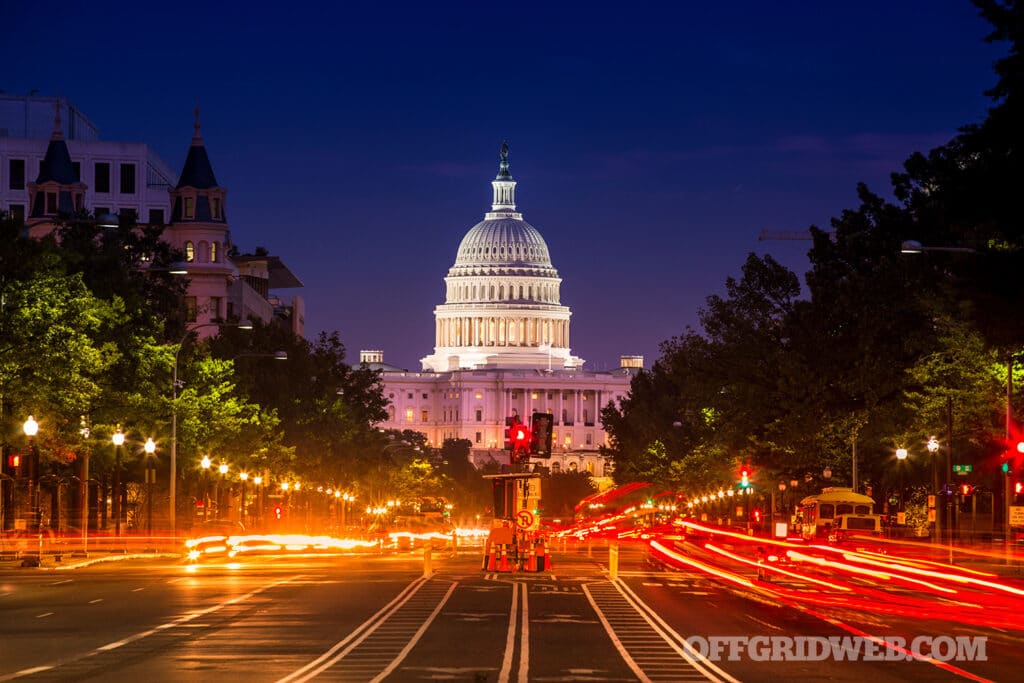
Above: Washington D.C. and its surrounding suburbs would be a challenging place to survive, as law enforcement and emergency services may be tasked with protecting high-priority areas
Former Government Contractor Jessica Spurlin’s Approach
Preparation
At first, the rhetoric and violence were equivalent to what we saw in previous election years — pundits fanning the flames, and mysterious pallets of bricks appearing on the street corners in downtown Washington, D.C. — but this year felt different. As issues compounded and the feeling of being pushed into a corner grew, my husband and I decided to take a few more steps to actively increase our overall preparedness.
Save your expressions for like-minded individuals.
In the lead up to the election, I reminded my family that we already know where we stand and where our neighbors stand. We know who we can trust, who is on the fence (likely a future victim), and who is a threat. The rest will identify themselves. This will minimize the immediate target on my family’s back while we assess the degree to which this situation evolves. Having a realistic understanding of our preparedness and what we may need will assist us in focusing on who we need to collaborate with. Having a plan to collaborate is vital.
Communication
We watched several countries in the past few years — for example, Iran, Venezuela, and Bangladesh — shut down their country’s Internet and mobile services in the face of political turmoil. Similarly, we saw an increase in physical and cyberattacks on communication and broadcast infrastructure. As the election got closer, my husband and I decided it was time to purchase a Starlink Roam.
Whether or not Starlink will stay online as America divides will depend on Elon Musk, but we decided to have one in our possession and then hedge our bets as to which side he lands. Having Internet with encrypted messaging apps, specifically Signal, will enable us to securely communicate with our network of like-minded individuals should cell service become unavailable. I would recommend downloading offline maps before they’re needed through applications like MAPS.ME or OsmAnd.
I would also print duplicative hard copies for a (rapidly approaching) rainy day. In terms of which maps, I would recommend local and regional maps, as well as detailed alternative routes to get to a “fall back” location, should it be needed. As a failsafe, we made sure our small handheld radios were operational, and our HAM radio could easily move from a static location to a mobile one.
Finances
Before the election, my husband and I increasingly withdrew cash from our bank accounts to ensure we had a healthy amount of cash on hand. On a normal day, most, if not all banks limit how much cash you can withdraw at one time. The average amount is maddeningly low, and that’s before a life-or-death scenario unfolds.
We did not want to wait to find out if the banks would freeze any of their constituents’ accounts for party-affiliation or just to prevent an overall run on the banks, should the situation deteriorate rapidly after the election.
Information is everything
Similar to the preparation of our communications equipment, I wanted to bolster our communication streams. I am not a fan of social media for a number of reasons (namely the overly aggressive backend algorithms desperate for your attention and the gross oversharing of individuals’ personal lives), but I am when it comes to open-source intelligence (OSINT).
Social media, especially X, breaks more stories in real time than mainstream media. Also, protestors (“mostly peaceful” or otherwise) often get their instructions from social media. I followed several local opposition leaders (on both sides) and multiple neighborhood/city accounts to help keep me informed of any potential unrest in our area.
These accounts are likely to provide insights on any tactics or trends being utilized, like arson, murders, or ethnic cleansing. I also started an anonymous regional account. It’s anonymous to protect my family’s identity and regional to spread truthful information and resources to my local community in the face of increased propaganda.
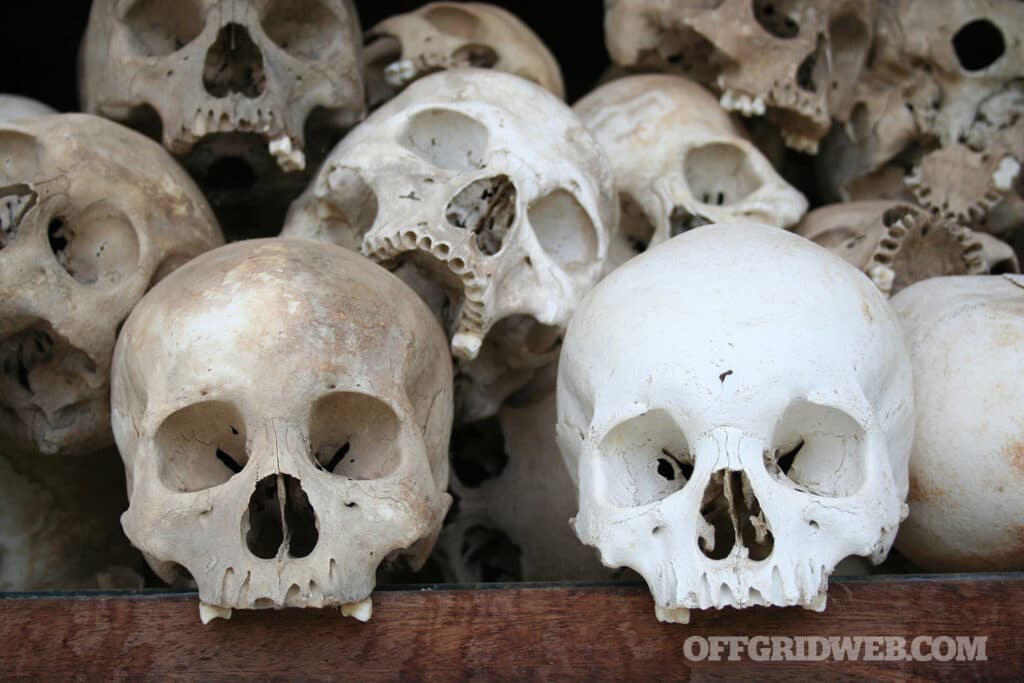
Above: When fractures within a region get deep enough, especially if they’re compounded by underlying ethnic and religious conflicts, violence may escalate into genocide and other atrocities.
On-Site
The civil unrest that ensued from the failed election was unparalleled. As the violence spread beyond its usual downtown locations, my husband and I pulled our children out of school to keep them safe. I knew targeted arson was a growing threat, so we focused our efforts there and quickly began preparing our house.
Home security
For our home, I tasked my kids with clearing any debris or easily flammable material away from the house. We made sure the hoses and running water were working and able to reach every part of the house. We bought more fire extinguishers and placed them where we could easily reach them in each room. My husband installed bright motion-sensor lights along our fence and added several very overt cameras.
We decided to keep our house dark to draw as little attention as possible, until someone (in this case a protestor/arsonist) got too close and triggered the lights. Best case scenario: the bright lights, cameras, and home alarm system act as a deterrent, and the would-be arsonists choose an easier target. If not, and the would-be arsonists are as dense as they seem, we’d prepare for the worst.
Personal security
As the saying goes, “Stay strapped or get clapped.” If arsonists and murderers step onto our property with the demonstrated intent to kill or harm my family, my husband and I will be exercising our Second Amendment right to bear arms. We will deal with the legal ramifications whenever civil society comes back online and there is any semblance of law and order. I would recommend adding a lawyer to your Rolodex of like-minded individuals, or at least invite them to your Signal chat.
Gear
The number of riots steadily increased and showed no signs of slowing. Local law enforcement was unable to respond to the high demands, and the National Guard was struggling in the city centers throughout the State. While we were thankful for our early preparation, we understood we would need to seriously prepare for long-term instability.
We purchased a solar-powered generator (Goal Zero), an extra hand-crank power bank, and lots of batteries for the handheld radios, flashlights, watches, etc.
We inventoried our medical kits and stocked up on additional over-the-counter medicine for a multitude of potential issues in the future. Since it was already late fall, we had all of our winter gear out and accessible. At this time, my husband and I were still undecided as to whether or not we should leave the area, but we did decide to acquire more cold weather gear should we need to relocate to a colder climate.
We also purchased a drone for overhead imagery to serve as an early warning system to alert us if rioters were approaching our neighborhood and potentially towards our house. Our oldest child liked this task of “fire watch” more than clearing debris.
Food Security
The well-oiled machine of resupplying food in America is incredibly fragile, and every major city, regardless of their State’s “political leanings,” is grossly ill-equipped to provide for their overpopulated residents. Whether it’s protestors blocking major highways or state officials blocking cross-state shipments, food security is going to be an issue. Knowing this — and the fact that every authoritarian socialist-communist takeover has brought mass starvation and death — my husband and I secured a year’s worth of meat in our freezer, as well as a dozen containers of 25-year emergency food. If you can, I’d recommend getting chickens too.
Transportation
My family and I worked to ensure we had everything we needed to survive this developing national crisis and made sure we had a way to move it all if we had to (looking at you, tactical minivan). Since we live so close to the airport, we took note of which planes were still operational, if they were commercial, private, or military, and how frequently they were flying. We’d use this data as another indicator if the riots were escalating into a full-scale civil war.
Crisis
Like Yugoslavia, a Balkanized America would likely divide amongst ethnic, cultural, and political lines. Whether or not my family and I stay in Northern Virginia, only 30 minutes from Washington, D.C., would depend on how many like-minded individuals are in our local community.
We’d also consider whether Northern Virginia could become a “stronghold” to stage out of and whether the capital is worth fighting over. Because Washington, D.C., like every major city, is predominantly skewed to one political party with fewer and fewer individuals who align with my stance, my family and I would leave. We would also leave sooner than later in case major highways were shut down and any state border crossings were implemented, since we would be moving all of our valuable gear as well.
Closing Thoughts
The Bosnian War saw horrible atrocities such as ethnic cleansing and mass rape. I strongly believe the United States would face similar outcomes if we were to dissolve into a Balkanized civil war. Unfortunately, I think this situation is increasingly more likely to occur in America with every passing day.
That said, my family and I would prepare early and add additional resources as needed to meet emerging tactics. We would find our community of like-minded individuals and, as they say, “brace for impact.”
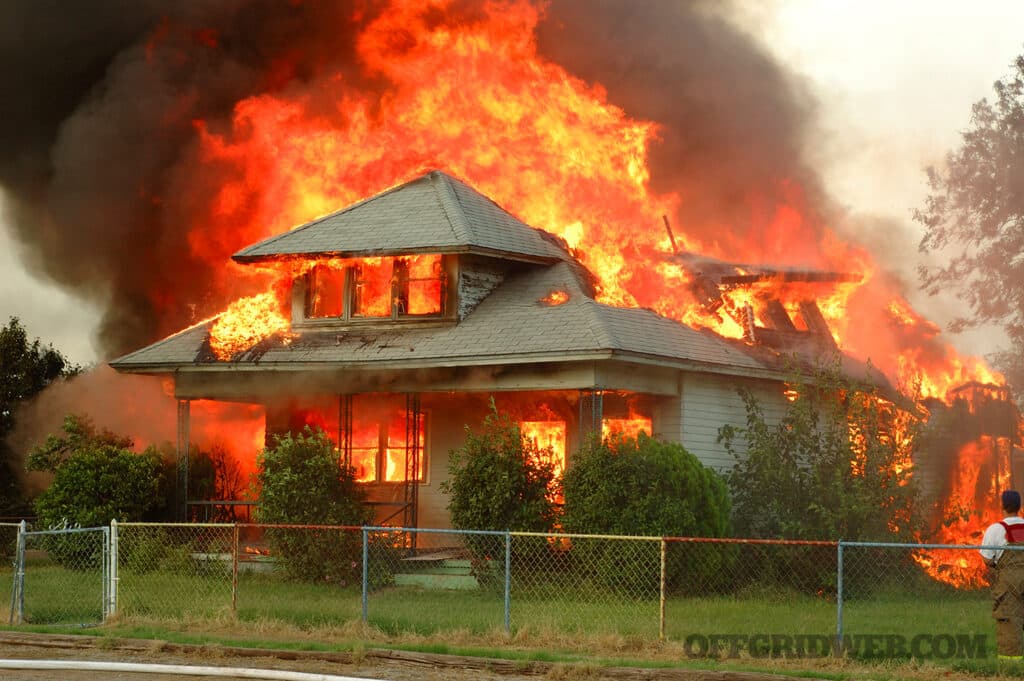
Above: Protecting your home from accidental fire is one thing, but defending against arson is more challenging. Have you considered a strategy?
Former Combat Medic Jon Wayne Taylor’s Approach
It’s been a weird life. I’ve served as a rural police officer, volunteer firefighter, and EMT going back for decades. I’ve provided medical care to vulnerable populations in some of the lousiest places on the planet in war and peace as an Army medic, a contractor, and as a volunteer. I’ve been an SME for large businesses seeking to develop infrastructure projects throughout the developing world. I’ve directly advised members of our state and federal governments at the highest levels. Now I run an insurance company. A common thread there is risk and how to make the best of bad choices.
If you’re stuck in one of the major metropolitan areas in the United States, you might be getting a little nervous. You might be stocking up guns, gear, food and other supplies.
Throughout my life’s work, I’ve seen communities on the edge of collapse, and beyond. I’m not stocking up and I’m not getting nervous. I’ve got basic supplies. I’ve got some guns. That’s not what I need.
The thing I need right now is to know what’s really going on around me. No reporter can tell me this. Social media will lie to me about this. This is the key intelligence that will drive all of my other key decisions. It is vitally important.
The best way any of us can gather information is to get to know our neighbors. Your neighbors are your first source of real intelligence, your most likely source of assistance, or your most immediate and significant threats. Talk to them. Get to know them. For folks that don’t really like folks (like me) that’s not easy, but it’s more important than your draw time, your food cache, or even the locks on your door. Make it the priority it deserves.
Be a good neighbor. Take their trash can out to the curb if they forget. Take special note and care of the old and infirm. Be kind. If you can’t talk to them, bake them (or buy them) some cookies and leave them a note saying “hi.” You might find you share a lot in common with them.
You might find you can depend on them. You also might find out you are surrounded by people who’d rather see you dead — if that’s the case, it’s better to know that now when you still have a chance to do something about it, like leave.
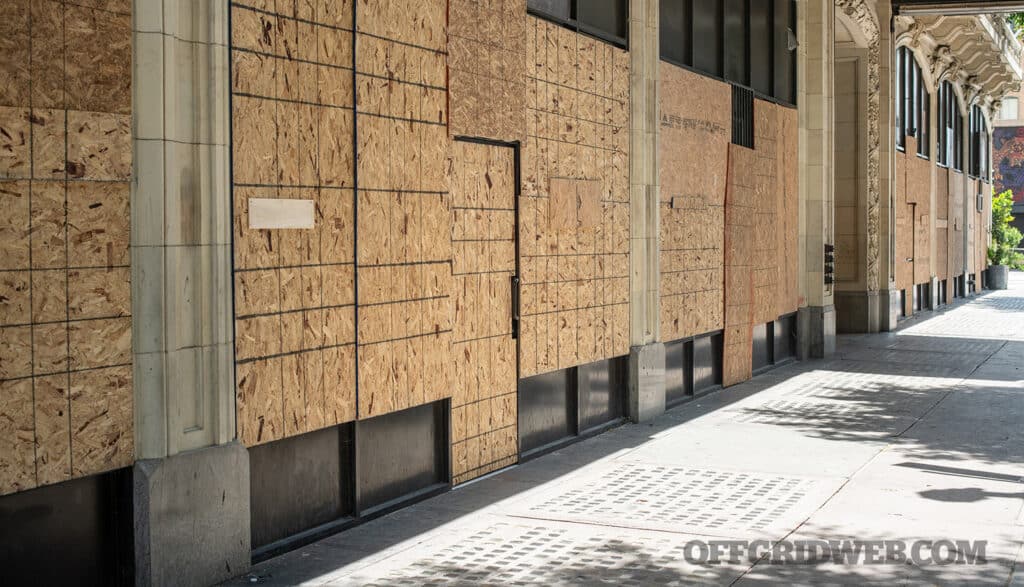
Above: Widespread civil unrest often forces businesses to close, making short-term resupply difficult or impossible.
I’ve seen the supreme value of community over and over again, all over the world, but the differences in community reactions between hurricanes Katrina and Harvey highlighted the need to know your neighbors better than any other.
During Katrina, I helped with medical triage and moving patients from the Superdome. People from the same neighborhoods were rescued at very different times, with the elderly often arriving last, sometimes many days later. Patients often arrived after being found by rescue teams during searches, even when people from the same neighborhoods had already arrived on their own. Looting was rampant and robberies and theft even inside the relief centers were common. Those people did not know each other.
During Harvey, Houston and all the surrounding cities flooded. I was volunteering with the Team 5 Medical Foundation providing direct medical treatment. Waterborne rescue units, like ours, used overpasses not only as dry-land refuge but as boat ramps. We were never the first to arrive. Time after time, there were local community members already there, and they weren’t just waiting for help, they were providing it. Teenagers in a car club told us about an apartment complex where the water rose so fast it trapped other enthusiasts on the third floor.
Others told us about people that were always around when they cooked out at a park on Sundays, and where they should be. In places where they had reception, some groups were running massive text chains tracking people who needed help and their locations, providing those to rescuers. In many communities, civilian organizations rescued everyone before government assets even arrived. That community engagement saved tens of thousands of lives. Those lives could be yours, your friends and family, especially if government assets won’t be arriving at all.
Looting during Harvey was extremely rare; theft in relief centers was unheard of. Those were neighbors helping neighbors.
Beyond simply talking to your neighbors, a great way to get that information is to join a service organization in your community. Ideally that would be something like a local fire department or other emergency service.
It doesn’t matter if it’s for pay or if you volunteer — get involved. Homeless shelters, food banks, EMT dispatch centers, prison services, all of these are good options. You want to find something that serves the community and is logistically tied into the formal infrastructure of that community.
Joining a community service organization will allow you to get direct, real-time knowledge of what is happening in and around your community beyond your own social group. If it is tied into the formal infrastructure of the community, you’ll also see when the need for those services rises (not good) and you’ll get an early indication on when those services are failing (very bad).
If you can’t join any of these organizations, befriend someone that did and talk to them regularly. When the COVID shutdowns kicked off, my wife, volunteering at a county food bank, told me she saw “soccer-moms in Escalades driving up asking for whatever they could get.” She saw people she’d never seen before asking for food.
That was a big sign that things were going awry, and not just because people were unreasonably scared. That huge influx of new people who could drive there in their expensive cars meant that there was no food left by the time the truly destitute families got there any way they could. Those later families went home with nothing, and now they were desperate. Desperate people do desperate things.
The failure of local systems to provide for the poor and indigent is one of the biggest signals that you should be taking immediate action. Another big one is the capacity of the local health care system. If you are a member of one of the aforementioned services, you’ll get an early warning of when these systems fail. A solid metric for trouble is when hospitals are diverting patients to other facilities, especially if they are different hospital systems.
Hospitals make money off patients. If they are sending those patients somewhere else, it’s because they can’t figure out a way to treat them. This has a rapidly cascading effect on a community, as people have to go farther and farther away for care. Primary care physicians, already stretched thin, are almost instantly overwhelmed.
If you don’t have direct access to that information, at least pay attention to hospital, urgent care, and minor emergency clinic parking lots. Are they completely full all of a sudden (without an accompanying natural disaster)? That’s not good. Did they get rapidly full and now they’re abandoned? That’s very, very bad.
I’ve experienced riots in South Africa, Haiti, and throughout the developing world. I’ve never seen one that didn’t raid the pharmacies first. People don’t care what they are stealing, they just steal everything. Now nobody’s kids get insulin or asthma medication without a fight. Add to that reality the significant portion of Americans on mental health medications for anxiety and panic disorders and now they can’t get their prescriptions filled. Welcome to Thunderdome.
When the social services in my area start failing, it’s time for me to call friends near and far away, check road conditions, keep the trucks gassed up, and keep my family close. That’s when I’m on my amateur radio talking to people all over the country, or farther, to find out what it’s like where they are and how easy it is to get there. Bags are getting packed. Family members get texted throughout the day, and everyone knows it’s time to be ready to leave.
If all the hospitals in my area are diverting patients, I pull my kids out of school and go somewhere else. Simple things like a broken leg from a fall or a car wreck become life and limb-threatening when you can’t get into the ER. That’s the most immediate and likely danger and it’s completely avoidable.
I feel truly sorry for the folks that don’t have the option to leave. Your only choice then is to harden up and wait it out. I’ve rarely seen that work in a suburban environment like those that surround DC if there is a large urban population nearby. The exception is some of the communities in Pretoria and Johannesburg, South Africa, that have been able to create their own walled and patrolled towns inside of cities. Anything short of that, and you just end up dying of some easily treatable illness or injury, or you get burned alive inside your well-stocked home. The first group to your door brings guns, the next group brings gasoline.
For the vast majority of people with families, like me, leaving is almost always the best option. Since you’ve talked to friends and family about routes of escape, there’s not a good enough reason to stay. All of your work with your neighbors and your community means that you had plenty of time to get ready. You probably had time to pack lots of stuff. Nobody is unduly stressed, and your decisions are based on real, actionable information, not broadcast fear.
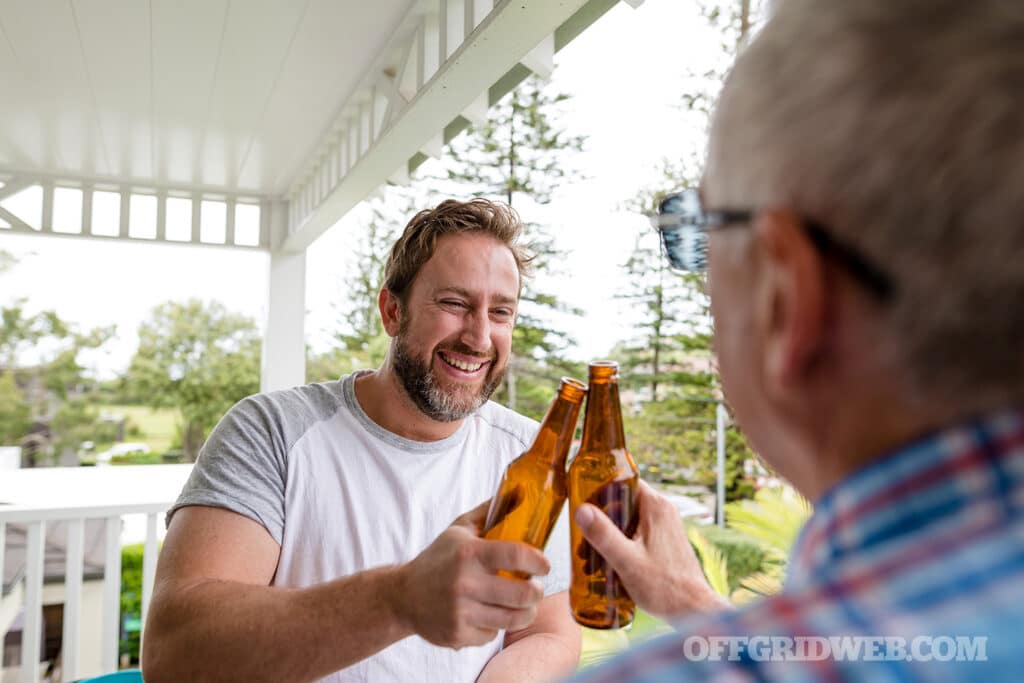
Above: Rather than allowing yourself to become consumed by division and anger, focus on building positive relationships with other members of your community.
Conclusion
Much like the Balkans, the United States is far from a homogeneous society — our nation is made up of states with enormous geographic, economic, cultural, ethnic, and religious differences. And it’s impossible to deny that we’re currently facing many of the same struggles, including tumultuous politics, media bias, rising inflation, internal division, and opposition from rival nations.
Some believe we’re doomed to follow in the footsteps of nations that have preceded us, while others are more hopeful. Regardless of your opinion on what the future holds, the prepared individual should ask two questions. First, what can I do to be ready for the worst-case scenario? Secondly, and more urgently, ask yourself how can I help prevent that outcome?
As the November election approaches, we encourage you to take a step back, unplug yourself from the 24/7 barrage of TV and internet political hysteria, and work on making friends rather than enemies.
Stronger communities yield stronger states and a stronger nation. As Founding Father Patrick Henry said in his last public speech in March 1799, “United we stand, divided we fall. Let us not split into factions which must destroy that union upon which our existence hangs.”
Meet Our Panel

Jessica Spurlin
Jessica Spurlin recently moved out of the Northern Virginia area after working as a government contractor for the past eight years. Academically, she received her master’s degree in Strategic Intelligence Studies with a focus on Russia, Eastern Europe, Iran, and the Middle East. She enjoys playing soccer, hiking, skydiving, and reading. Spurlin is a world traveler and outdoor enthusiast with a passion for international affairs.

Jon Wayne Taylor
Jon Wayne Taylor is a former U.S. Army combat medic and military medical advisor who has trained and supervised medical personnel in remote and hostile environments around the world. Both before and after his military service, Taylor’s worked as a rural police officer, volunteer firefighter, EMT, and TCCC instructor. He has also been appointed as a high-level advisor to state and federal government agencies regarding critical infrastructure projects. You can follow him on Instagram at @jonwaynetaylor.
Read More
Don’t miss essential survival insights—sign up for Recoil Offgrid's free newsletter today!
Check out our other publications on the web: Recoil | Gun Digest | Blade | RecoilTV | RECOILtv (YouTube)
Editor's Note: This article has been modified from its original version for the web.
The post What If: America Is Fragmented appeared first on RECOIL OFFGRID.
By: Nick Italiano
Title: What If: America Is Fragmented
Sourced From: www.offgridweb.com/survival/what-if-america-is-fragmented/
Published Date: Wed, 23 Oct 2024 11:00:53 +0000
------------------------
Did you miss our previous article...
https://bushcrafttips.com/bushcraft-news/pocket-preps-nonmetallic-knives
 What is BushcraftSurvival SkillsToolsVideosBushcraft CampsBushcraft KitsBushcraft ProjectsPrivacy PolicyTerms And Conditions
What is BushcraftSurvival SkillsToolsVideosBushcraft CampsBushcraft KitsBushcraft ProjectsPrivacy PolicyTerms And Conditions
